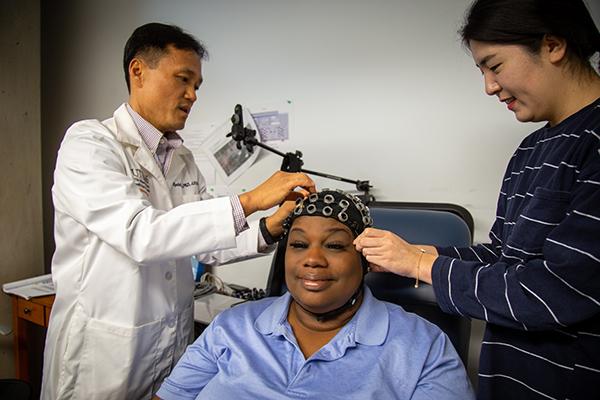
Credit: Photo by Maricruz Kwon/UTHealth
Tired of living with painful arthritic knees, 54-year-old Deborah Brown’s interest was piqued when she saw a recruitment flyer for a clinical trial on an innovative pain treatment at The University of Texas Health Science Center at Houston (UTHealth).
“My knees feel like bone on bone,” said Brown, who works at a blood donation center. “It’s a shooting pain and it has been getting worse.”
That joint pain that Brown and other osteoarthritis patients experience has been traced to a part of the brain called the primary motor cortex.
Hyochol “Brian” Ahn, PhD, ANP-BC, the study’s principal investigator and an associate professor with Cizik School of Nursing at UTHealth, believes he can stop knee pain by administering tiny electrical charges to this area in the brain.
“This study has the potential to significantly improve the self-management of pain, decrease public health expenditures, and improve the quality of life for older adults,” said Ahn, the Theodore J. and Mary E. Trumble Professor in Aging Research at Cizik School of Nursing.
Ahn said the brain is an electrochemical organ that processes pain and that his team is trying to desensitize the areas tied to knee pain.
Study participants wear a cap powered with three AAA batteries that relays a weak current between a positive and negative electrode. There are 15, 20-minute sessions over a three-week period.
To see if the brain stimulation works, participants are asked to rate their pain on a scale of 1 to 100 before and after the treatment to complete a questionnaire. Researchers will also review medical images of the brains of participants for possible changes.
To establish the validity of the experiment, Ahn is creating a control group comprised of volunteers who do not receive enough brain stimulation to make a difference. “They’re our baseline and their scores will be compared to the people receiving full treatment,” Ahn said.
“Knee osteoarthritis pain is one of the most common pain conditions among people more than 45 years of age, and pharmacological interventions do not adequately address this common condition,” Ahn said.
The clinical trial, Self-Administered Transcranial Direct Current Stimulation for Pain in Older Adults With Knee Osteoarthritis: A Phase II Randomized Sham-Controlled Trial, runs through July 31, 2022, and is designed to test the efficacy of the device.
The study is funded by National Institutes of Health (R15NR018050) and Ahn hopes to recruit 120 volunteers.
To be eligible, volunteers must be 50 to 85 years of age, have no serious medical conditions (e.g., brain tumor, seizure, or stroke) and be able to attend four sessions in the Texas Medical Center. For more information, call 713-500-2179.
Said Brown, “I feel a little tingling when I wear the cap. I hope it works. I’m tired of the pain pills.”
###
Media Inquiries – 713-500-3030
Media Contact
Robert Cahill
[email protected]
713-500-3030
Original Source
https:/




